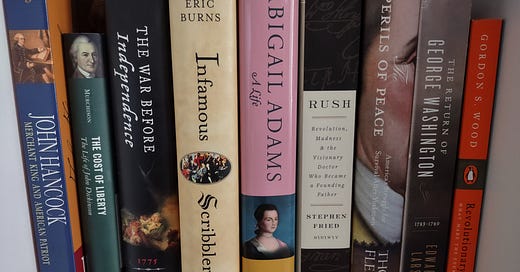A lot of good history books are out there, more than I can possibly keep up with. Sitting on my bookshelves are quite a few that I read a while back. I’d need to reread them to do a full write-up on each, but I can still recommend them.
I’ll pick five good ones that cover the era surrounding the American Revolution. I might revisit these if I ever do get around to rereading them, but they deserve acknowledgment regardless.
1. Revolutionary Characters
You can always rely on Gordon S. Wood to write a solid book on this era. This one, Revolutionary Characters: What Made the Founders Different, serves as a good primer on several key figures of the era. Wood devotes a different chapter to each: George Washington, Benjamin Franklin, Thomas Jefferson, Alexander Hamilton, James Madison, John Adams, Thomas Paine, and Aaron Burr.
If you’re just beginning to read about the era, this book is a good place to start. If you’ve already read quite a bit, it’s a nice refresher. Either way, Revolutionary Characters is a solid book and a relatively quick read.
2. The Cost of Liberty
You may remember him as the chief antagonist of the musical 1776, but the real John Dickinson was a much more interesting individual than that. William Murchison gives him the spotlight in The Cost of Liberty: The Life of John Dickinson.
Dickinson may have refused to sign the Declaration of Independence, but he did fight for his new country during the Revolutionary War. He was a principled man who wasn’t afraid to go against popular opinion. Any revolution would benefit from a guy who advises people to slow down.
3. Infamous Scribblers
Eric Burns covers the history of journalism in America in Infamous Scribblers: The Founding Fathers and the Rowdy Beginnings of American Journalism.
The book starts with the earliest publications of the colonial era and ends with the death of Alexander Hamilton, which serves as an appropriate stopping point, given what a lightning rod Hamilton was.
A nice mix of well-known and lesser-known figures factor into the book, and the whole thing is rather entertaining. Before there was the Wild West, there was colonial journalism.
4. Abigail Adams
The Founding Mothers deserve their own biographies, especially Abigail Adams. In a later era, she might have been more directly involved in key events. As it was, she was never an ordinary 18th-century housewife.
Woody Holton has crafted a comprehensive biography in Abigail Adams: A Life, providing a much-needed feminine view of the era. Yes, you should read about John Adams, but don’t stop there. Learn about his intellectual partner, who no doubt influenced our country more than we realize.
5. Rush
Benjamin Rush is a name that pops up in other people’s biographies, as he was a frequent correspondent with the likes of John Adams and Thomas Jefferson. In fact, he even helped Adams and Jefferson reconcile in later years.
But Rush merits his own biography as well. Stephen Fried has provided a strong one with Rush: Revolution, Madness & the Visionary Doctor Who Became a Founding Father.
As the subtitle indicates, this book goes beyond founding-era politics. Rush’s life provides a great opportunity to learn about medicine of the time, particularly the treatment of mental illness.
Hopefully, at least one or two of the above have piqued your interest. In any case, there’s always more to read (or reread).





